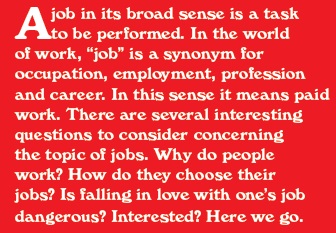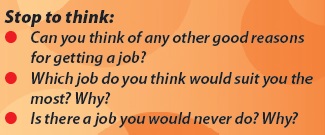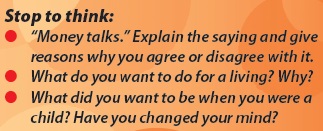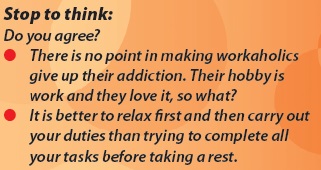 Reasons
Reasons
Why do people have jobs? “Money of course,” I can hear you say. You are quite right. The world of work is run, determined and infl uenced by the power of money. Every single employee1 can be highly motivated by the vision of a decent salary. But apart from the materialistic aspect of employment, there are other advantages of having a job.
One of them is social life. Regular contacts with colleagues2 are inspiring. Dealing with both pleasant and unpleasant people makes us more civilised, informed and sophisticated3.
Ask a jobless person or a lady on maternity leave4. They will tell you how frustrating social isolation can be!
Another advantage of having a job is exercising your brain. Keeping up with new technologies, problem solving and continual studying make our brains more alert5. You probably know that people who keep their minds active tend to avoid some problems of old age such as forgetfulness.
What is more, work provides us with a certain degree of discipline. A period of organized time prevents us from getting  idle6, ignorant and apathetic7. Of course, the idea of not having to get up early in the morning and do what you don’t like sounds like heaven. For a short period it is fi ne but can you imagine weeks, months or even years with no sense of purpose? No thank you!
idle6, ignorant and apathetic7. Of course, the idea of not having to get up early in the morning and do what you don’t like sounds like heaven. For a short period it is fi ne but can you imagine weeks, months or even years with no sense of purpose? No thank you!
Finally, we can’t omit the results of work. From a psychological point of view, it is highly satisfying to look back and see the benefi t of our work. It makes us feel useful and needed. Without that, working would be pointless.
Decisions
What are the criteria of choosing a particular job? “Money,” I can hear you say again. (See how hopelessly materialistic our thinking is?!) Many a time people willingly sacrifice8 a job they like for a hated but well-paid job. Unfortunately, that’s the reality. Money talks. However, people also make decisions according to their interests, preferences and abilities. You can hardly expect a person who doesn’t like animals to become a vet or a quiet, shy person to become an eloquent9 TV presenter!
Another thing some people take into consideration is a family tradition: your grandfather was a lawyer; your father is a lawyer, so you are more or less expected to become a lawyer too. It is sometimes quite diffi cult for such people to get their own way. By the way, have you noticed how our childhood dreams about work alter? When we were kids, we dreamed about becoming doctors, teachers, footballers and actresses, not to mention some absurd ambitions such as princesses and superheroes. Why do we abandon10 our dreams?
As we grow up, we become more realistic about our abilities and chances. We get infl uenced by diff erent things and people that inspire and encourage us to change our minds. Thus a fi lm star-to-be falls in love with chemistry and spends most of her life closed up in a lab instead of studios. Driving a dustcart doesn’t seem attractive any more. Becoming a surgeon means hard study and even harder work so you take up a different job, etc.
Workaholism
Even though taking pleasure in one’s job is desirable, it can easily become a trap11. Do you know anybody who works long hours, sometimes even over weekends, a person who never takes holidays and never switches off their mobile phone? Welcome to the world of workaholics!
Those people are unable to lead a balanced life and neglect not only their family, friends and hobbies, but also their biological needs such as nutrition12 and sleep. Some statistics say that children of parents addicted to work experience even higher anxiety13 than kids of alcoholic parents.
It is extremely important to draw a line between work and privacy, not only for the sake of one’s family members but also to maintain a high quality of work performance. After all, an overworked,exhausted employee is no employer’s dream!
Special task
Complete the chart below in pairs or small groups. Then compare it with the rest of the class and discuss the differences.

Miroslava Dubanová
Vocabulary: 1/emploii:/ zamestnanec – zaměstnanec; 2/koli:g/ kolega; 3sofi stikovaný, inteligentný – inteligentní; 4materská dovolenka – mateřská dovolená; 5pozorný, ostražitý – pozorný, bdělý; 6bez práce, v nečinnosti; 7apatický – netečný; 8vzdať sa, obetovať – vzdát se, obětovat; 9dobre hovoriaci človek – výmluvný; 10opustiť, zanechať – opustit, zanechat; 11pasca – past; 12/nju:triš∂n/ výživa; 13/æŋzai∂ti/ úzkosť, strach – úzkost, strach

